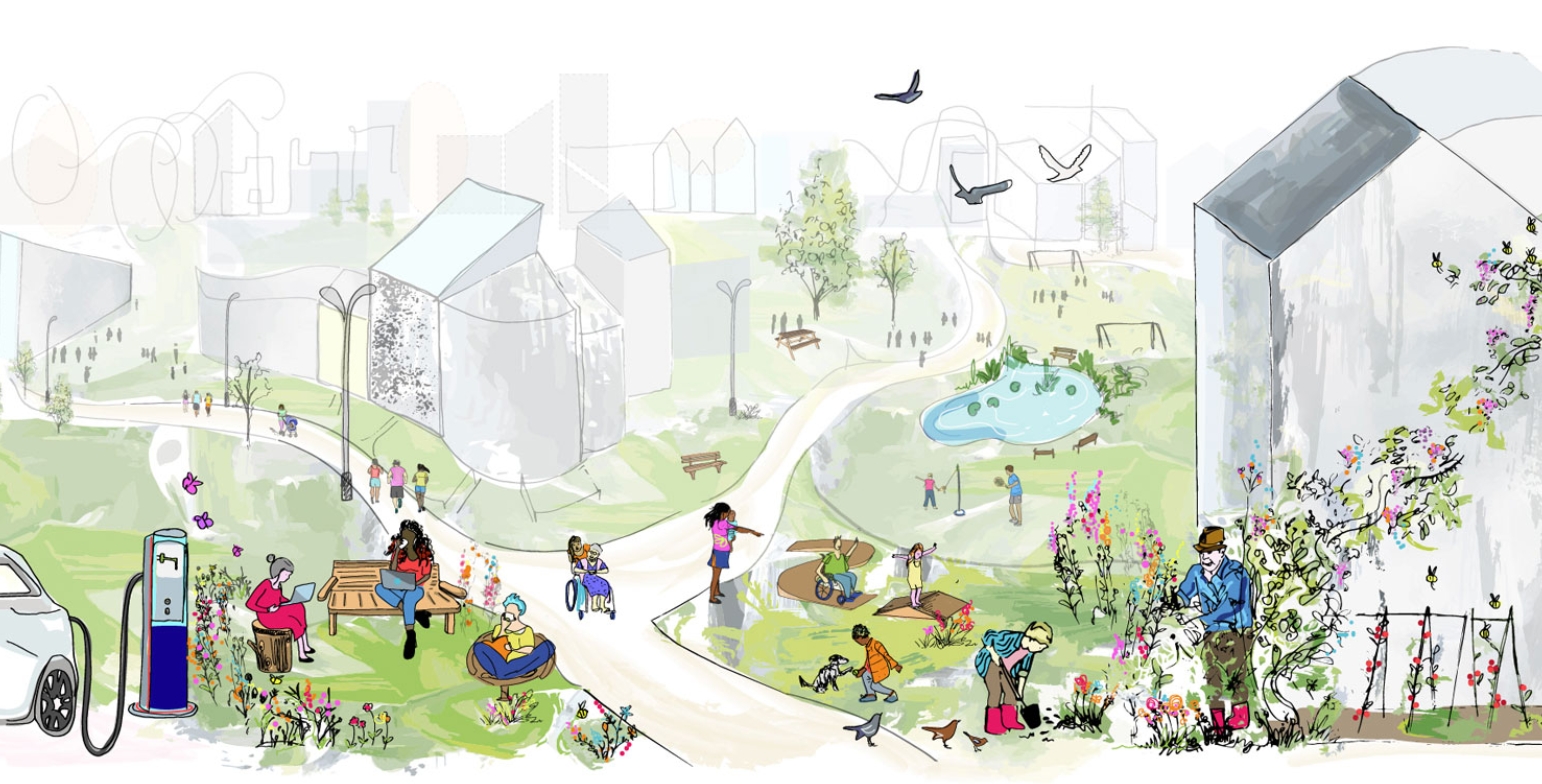BRE congratulates Home of 2030 winners
Contents |
[edit] Introduction
Housing Minister Chris Pincher announced the joint winners of the Home of 2030 competition at an event hosted by BRE CEO Gillian Charlesworth. The announcement was made on 4 December 2020 at HOMES UK.
[edit] Winners and finalists
Sharing the honours, the winners were:
+Home designed by igloo Regeneration with Useful Projects, Expedition Engineers and Mawson Kerr, which proposes community-led self-build homes that people can design themselves.
Connector Housing designed by Openstudio with Hoare Lea, LDA Design and Gardiner & Theobald, a flexible and adaptable system for age-friendly, multi-generational housing and neighbourhoods.
The other four shortlisted teams, and their proposals, were:
Perpendicular Architecture, humblebee and changebuilding, with a team including EcoSystems Exterior Architecture and Arup with Positive+House which uses the latest in industry digitalisation and a distributed offsite manufacturing.
HLM Architects with University of Sheffield Advanced Manufacturing Research Centre (AMRC), Mid Group, Hydrock and Greenbuild, with a ‘Forever Home’ based on a universal manufacturing platform that enables flexible, affordable, and sustainable homes that perpetuate a circular economy.
Outpost with Propagating Dan, Strawworks, Gaia Group, Max Fordham, Milk, Momentum and EcoCocon with Janus, which combines traditional bio-based construction materials with modern 21st century techniques to create homes that are designed for a post fossil fuel age.
Studio OPEN with Elementa Consulting, with a community-focused ‘Forest City’ design, with a central garden shared between four homes which are built from locally sourced materials and with modern construction methods.
FInd more information about Home of 2030.
[edit] Observations and congratulations for the winners
BRE was the lead consortium competition delivery partner, with its Strategic Advisory team working alongside other leading homes organisations including RIBA, Design Council and MOBIE. BRE was delighted to congratulate the joint winners, who both proposed creative and innovative solutions to challenges the organisation is also working to address.
The Home of 2030 programme also included a Young Persons’ Challenge, an innovation challenge for manufacturers of new products and systems and a public engagement exercise to understand what people want from future homes.
BRE’s Smart Assets Lead Dr Ozak Esu was on the judging panel for the Young Persons’ Challenge, which was won by University of Nottingham student Rachael Milliner. Her ‘Urban Co-Existing’ design focused on the Meadows Estate in Nottingham, reinvigorating the area with urban farming spaces which give residents access to fresh, healthy food.
Of the entries, Dr Esu said, "I was impressed by the innovative ideas and enthusiasm demonstrated by the entrants, their considerations for sustainability, ideas for implementing technology, healthy, age friendly and inclusive living.
"These entries show the incredible pipeline of talent in schools and universities, which our industry stands to gain through sustained encouragement and initiatives like the Home of 2030 competition. Congratulations to the winner and finalists!"
Although the competition has formally ended, the Home of 2030 project continues in a number of ways with the intention of going on to inspire new homes. BRE is also supporting Homes England in introducing the finalists to development partners to discuss opportunities for construction.
This article originally appeared on the BRE Group website. It was published in January 2021.
[edit] Related articles on Designing Buildings Wiki
Featured articles and news
Reform of the fire engineering profession
Fire Engineers Advisory Panel: Authoritative Statement, reactions and next steps.
Restoration and renewal of the Palace of Westminster
A complex project of cultural significance from full decant to EMI, opportunities and a potential a way forward.
Apprenticeships and the responsibility we share
Perspectives from the CIOB President as National Apprentice Week comes to a close.
The first line of defence against rain, wind and snow.
Building Safety recap January, 2026
What we missed at the end of last year, and at the start of this...
National Apprenticeship Week 2026, 9-15 Feb
Shining a light on the positive impacts for businesses, their apprentices and the wider economy alike.
Applications and benefits of acoustic flooring
From commercial to retail.
From solid to sprung and ribbed to raised.
Strengthening industry collaboration in Hong Kong
Hong Kong Institute of Construction and The Chartered Institute of Building sign Memorandum of Understanding.
A detailed description from the experts at Cornish Lime.
IHBC planning for growth with corporate plan development
Grow with the Institute by volunteering and CP25 consultation.
Connecting ambition and action for designers and specifiers.
Electrical skills gap deepens as apprenticeship starts fall despite surging demand says ECA.
Built environment bodies deepen joint action on EDI
B.E.Inclusive initiative agree next phase of joint equity, diversity and inclusion (EDI) action plan.
Recognising culture as key to sustainable economic growth
Creative UK Provocation paper: Culture as Growth Infrastructure.
Futurebuild and UK Construction Week London Unite
Creating the UK’s Built Environment Super Event and over 25 other key partnerships.
Welsh and Scottish 2026 elections
Manifestos for the built environment for upcoming same May day elections.
Advancing BIM education with a competency framework
“We don’t need people who can just draw in 3D. We need people who can think in data.”

























